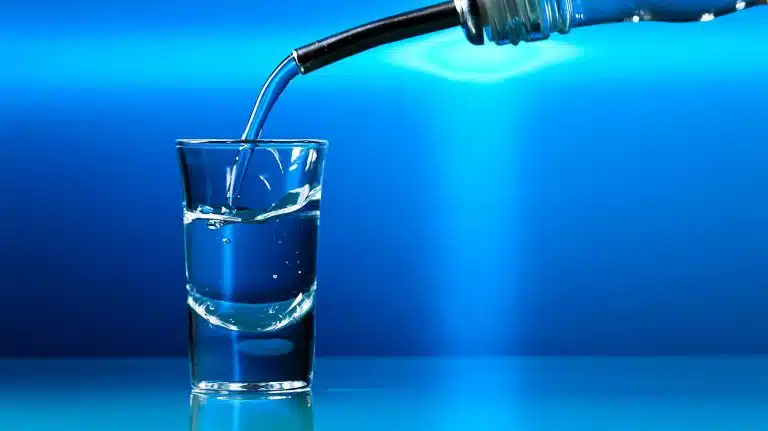Vodka Vs. Tequila | What Are The Differences?

Vodka and tequila are two distilled spirits that, based on appearance alone, could easily be mistaken for each other. However, they have more differences than they have similarities.
The two types of alcohol are from different places and are made with different ingredients, and they also taste very different.
Vodka
Vodka is a distilled alcoholic beverage that is primarily made of water and ethanol (alcohol). It originally came from Russia and Poland. While potatoes are the most well-known ingredient, vodka can be made with grains like wheat or barley, fruits, or sugars.
It’s made by mixing some form of starch or grain with yeast to begin fermentation. This mixture then goes through a distillation process to filter out any impurities and increase the alcohol content. The alcohol by volume (ABV) can range from 40-96%.
Tequila
Tequila is also a distilled alcoholic beverage but is made from the fermented juice of the Weber blue agave plant. It originally came from Tequila, Mexico, but there are five Mexican states legally allowed to make tequila including Jalisco, Guanajuato, Tamaulipas, Michoacan, and Nayarit.
To make tequila, the heart of the blue agave plant (known as the piña) is taken and roasted. The hearts are then pressed and shredded so they release their sugary juices. It then goes into tanks for fermentation. After fermentation, the liquid is distilled at least twice.
There are five different types of tequila, including:
- blanco tequila: unaged and the purest
- gold tequilas: unaged but mixed with caramel or other additives
- reposado: aged for at least two months in wooden casks
- añejo: aged for 18 months to three years in oak barrels or used bourbon barrels
- extra-añejo: aged for over three years in oak barrels
Vodka Vs. Tequila: Differences
Although both alcoholic drinks are clear distilled spirits, Tequila and vodka have several differences.
Place Of Origin
One of the main differences between the two spirits is where they were first made. Vodka started in Russia and Poland while tequila is from Mexico.
Ingredients
Vodka is made from water, starch or grains, and ethanol. Tequila is made from the blue agave plant.
Types
There are five different kinds of tequila. That varies greatly from the two kinds of vodka: neutral and flavored.
Cost
Tequila is generally more expensive than vodka, but not by much.
In the US, vodka is more popular than tequila, which drives the prices down for vodka. A bottle of vodka ranges in cost from $15 to $25 on average. Tequila is less popular in the US and is around $26-40, depending on the quality.
Taste
Vodka tastes very neutral in flavor. It doesn’t taste like much at all unless it’s flavored.
The taste of tequila depends on whether it’s aged or not. Some taste more earthy and sweet than others. Aged tequila may also have hints of oak or vanilla depending on the barrel it was in.
Appearance
While vodka and tequila can look exactly the same, it really depends on the type of tequila you’re comparing it to. An aged tequila will be golden in color and look quite different from vodka. But if it is a young or non-aged tequila, they likely appear very similar.
Vodka Vs. Tequila: Similarities
Despite their many differences, tequila and vodka have some similarities as well.
Alcohol Content
The ABV of vodka and tequila can range depending on how they’re made, but the average ABV is about the same for both spirits. Vodka averages at about 40% ABV while tequila’s average is about 38-40% ABV.
Serving
Both vodka and tequila are served in similar ways. They’re either poured in a shot and taken straight or they’re mixed with other alcohol or fruit juices and served as cocktails.
For example, people often drink tequila in a margarita while vodka is often seen in a bloody mary or a screwdriver.
Effects On The Body
Because both are alcoholic drinks, vodka and tequila have no health benefits to the body but do have negative effects if drank in excessive amounts.
Drinking tequila or vodka in moderation may not cause negative health issues, but persistent binge drinking or heavy drinking can lead to adverse effects like:
- liver damage
- memory loss
- nausea
- vomiting
- impaired coordination
- impaired judgment
- high blood pressure
- irregular heartbeat
If you or a loved one struggle with alcohol use, call our helpline today to find the treatment program that’s right for you.
Written by Ark Behavioral Health Editorial Team
©2024 Ark National Holdings, LLC. | All Rights Reserved.
This page does not provide medical advice.
Centers for Disease Control and Prevention (CDC) - Alcohol Use and Your Health
National Institute on Alcohol Abuse and Alcoholism (NIAAA) - Alcohol's Effects on the Body
Virginia Alcoholic Beverage Control Authority - Buying Guide for Tequila
Questions About Treatment?
Ark Behavioral Health offers 100% confidential substance abuse assessment and treatment placement tailored to your individual needs. Achieve long-term recovery.
100% confidential. We respect your privacy.
Prefer Texting?
Our friendly support team is here to chat 24/7. Opt out any time.







 Learn More
Learn More








